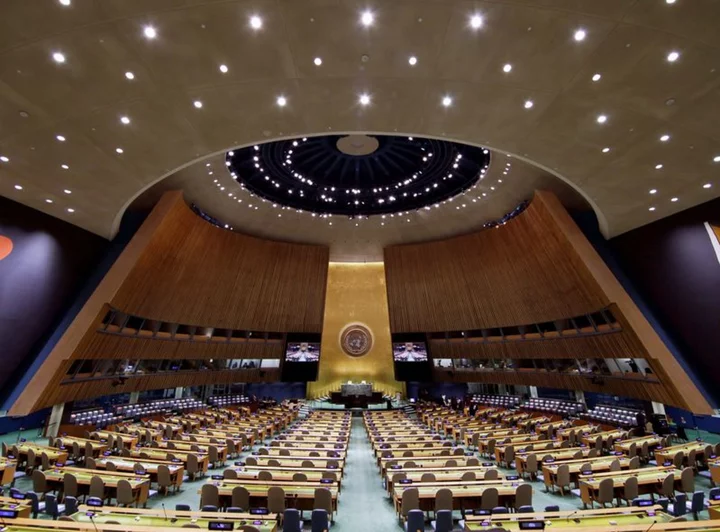By Michelle Nichols
UNITED NATIONS World leaders meet at the United Nations next week in the shadow of geopolitical tensions - largely fueled by the war in Ukraine - as Russia and China vie with the United States and Europe to win over developing countries.
Russia's war in Ukraine, well into its second year, will again be a focus of the annual gathering in New York, with Ukrainian President Volodymyr Zelenskiy attending in person for the first time since the conflict started.
Also high on the agenda this year will be concerns of the Global South, in part a reflection of the increased attention put on the developing world by Western nations eager to secure its support for the effort to isolate Russia.
Several top-level meetings happening during the General Assembly focus on priorities of developing countries in Africa, Latin America and Asia: climate, health, financing for development, and how to get the Sustainable Development Goals - a global "to do" list created in 2015 - on track.
"This is a year when the countries of the Global South have set the agenda," said Richard Gowan, U.N. director of the International Crisis Group think tank.
"Non-western countries have played this moment quite effectively," he said. "I think they have taken advantage of the fact that they know that the U.S., on one hand, and then Russia on the other, want their support."
BILLIONS FOR INFRASTRUCTURE
The Ukraine war is just one reason for the focus on developing countries.
Over the past decade China has doled out hundreds of billions of dollars in loans for much-needed infrastructure projects as part of its Belt and Road initiative, which has come under criticism for saddling many nations with heavy debts.
The United States and its allies have recently tried to counter China's growing influence with their own pledges of money for development and climate aid.
Ahead of the New York meetings, diplomats acknowledged their focus on the developing world but dismissed suggestions that rivalry played a role.
U.S. Ambassador to the United Nations, Linda Thomas-Greenfield, described the U.N. gathering as a chance for small countries to "lay out their priorities to us" and that she doesn't view it "as being a competition between big powers."
China's U.N. Ambassador Zhang Jun told Reuters that Beijing has "no intention to compete with anyone else" and that, as China's conditions improved, the country was "willing to do more in return for developing countries but we are not competing."
Similarly, Russia's U.N. Ambassador Vassily Nebenzia told Reuters that Moscow was not "trying to enchant anyone."
"We're just what we are and we will never condition our friendship with anybody on stepping in line and doing what we want - unlike some of our colleagues here who are twisting arms," he said.
Top-level talks between China, Russia and the U.S. are out of the question next week as President Joe Biden will be the only leader to attend from the permanent five veto-wielding U.N. Security Council members.
Three years after leaders were forced to send video messages to the week-long U.N. General Assembly meeting during the COVID-19 pandemic, the more than 140 heads of state and government and dozens of ministers are due to turn up in person.
"It is a one-of-a-kind moment each year for leaders from every corner of the globe to not only assess the state of the world – but to act for the common good," said U.N. Secretary-General Antonio Guterres.
"People are looking to their leaders for a way out of this mess," he said, citing the climate crisis, escalating conflicts, a global cost-of-living crisis, soaring inequalities and dramatic technological disruptions.
THE "BIG SHOW"
Zelenskiy is expected to address the General Assembly on Tuesday and speak at a U.N. Security Council meeting on Ukraine on Wednesday that could place him at the same table as Russian Foreign Minister Sergei Lavrov.
Nebenzia predicted the planned council meeting would simply be a "big show."
Western diplomats are keen to show that their efforts to diplomatically target Russia over the war in Ukraine does not mean they can't focus on other crises and issues important to the rest of the world.
"It's not a case of either/or. We need to do both," said British U.N. Ambassador Barbara Woodward, describing Russia's invasion as "an attack on everything the U.N. stands for."
Still, a senior European diplomat, speaking on condition of anonymity, cautioned that geopolitical tensions could push more developing countries away from Western-led efforts and toward the BRICS group - Brazil, Russia, India, China and South Africa - in the hope that it can "better deliver on some of the interests of the developing world."
Last month, the BRICS - where China is the heavyweight - added half a dozen more countries to the bloc in a push to reshuffle a world order it sees as outdated.
The U.N. is unable "to show African youths' that their impatience for jobs can be answered by democracy not soldiers," said an African diplomat, speaking on condition of anonymity.
"If no one is standing with them, then the BRICS - whatever they offer - will be attractive," the diplomat said.
(Reporting by Michelle Nichols; Editing by Don Durfee and Howard Goller)

